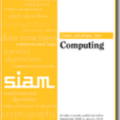A cut sparsifier is a reweighted subgraph that maintains the weights of the cuts of the original graph up to a multiplicative factor of $(1\pm\epsilon)$. This paper considers computing cut sparsifiers of weighted graphs of size $O(n\log (n)/\epsilon^2)$. Our algorithm computes such a sparsifier in time $O(m\cdot\min(\alpha(n)\log(m/n),\log (n)))$, where $\alpha(\cdot)$ is the functional inverse of Ackermann's function, both for graphs with polynomially bounded and unbounded integer weights. This improves upon the state of the art by Bencz\'ur and Karger (SICOMP 2015), which takes $O(m\log^2 (n))$ rounds. For unbounded weights, this directly gives the best known result for cut sparsification. Together with preprocessing by an algorithm of Fung et al. (SICOMP 2019), this also gives the best known result for polynomially-weighted graphs. Consequently, this implies the fastest approximate min-cut algorithm, both for graphs with polynomial and unbounded weights. In particular, we show that it is possible to adapt the state of the art algorithm of Fung et al. (SICOMP 2019) for unweighted graphs to weighted graphs, by letting the partial maximum spanning forest (MSF) packing take the place of the Nagamochi-Ibaraki (NI) forest packing. MSF packings have previously been used by Abraham at al.\ (FOCS 2016) in the dynamic setting, and are defined as follows: an $M$-partial MSF packing of $G$ is a set $\mathcal{F}=\{F_1, \dots, F_M\}$, where $F_i$ is a maximum spanning forest in $G\setminus \bigcup_{j=1}^{i-1}F_j$. Our method for computing (a sufficient estimation of) the MSF packing is the bottleneck in the running time of our sparsification algorithm.
翻译:剪切的 spacter 是一个重新加权的子集, 将原始图表的削减量维持在( 1\ pm\\ epsilon) $( 1\ pm\\ epsilon) 的倍增效应 。 本文将考虑大小的加权图形计算为 $O( log( n)/\ epsilon2) $。 我们的算法计算了这样的累累增器 $( pha)\ log( m/ n),\ log (n) ) 美元, 其中, 美元(\ cdot) 是 Ackermann 函数的反正数值。 对于具有多角度约束和未约束的 markrassal 重量的图形来说, 美元( SIPral) 的递减量值最大值是 。 ( ASFSF) 的算法中, 以 20 ormaxals massionals 的直數值為最高值。




